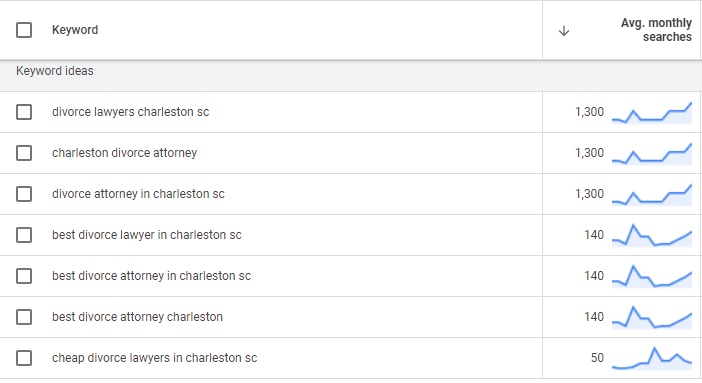In the local search landscape securing a top spot has become an essential goal for businesses across the spectrum. Amid this race, one potent yet frequently undervalued player has proven to be transformational: long-tail keywords. These specific, sharply targeted phrases are vital in assisting businesses to establish a connection with their local clientele, amplify their digital footprint, and channel high-quality traffic to their web presence.
What are Long-Tail Keywords?
Long-tail keywords are specific phrases typically composed of three to five words. Unlike generic or 'head' keywords which are usually one or two words, long-tail keywords are designed to capture a more targeted search intent. For instance, instead of searching for 'divorce attorney,' a user might search for 'divorce attorney in charleston sc' The latter is a clear example of a long-tail keyword.These keywords are less competitive than generic keywords, making them a goldmine for local businesses. Why? Because they attract users who know precisely what they're looking for – these users are more likely to convert into customers!
Benefits of Keyword Research for Local Businesses
Keyword research is an essential aspect of local SEO. By doing keyword research, local businesses can identify the most relevant long-tail keywords for their business and create content that targets those keywords. This can help businesses improve their search engine rankings and drive more traffic to their website.
Many local businesses tend to assume that short and direct keywords are the key to high-volume local searches, but the reality is that users tend to use long-tail keywords to find specific products or services. For example, searching for "divorce lawyers" in Charleston DMA shows only 210 searches.
However, If you look at the list below, there are many long-tail keywords that have higher searches
Therefore, it is imperative for businesses to optimize their content for both short and long-tail keywords to reach a wider audience and attract more potential customers. By doing so, businesses can significantly increase their chances of being discovered and chosen by potential customers.
How to Find Long-Tail Keywords
Finding the right long-tail keywords is crucial. Here's a breakdown of methods local businesses can use:
- Google's "People Also Ask" and Related Searches:
- Type your main keyword into Google and scroll down. The "People Also Ask" and "Related Searches" sections offer valuable insights into what users are searching for.
- Google Keyword Planner:
- This free tool from Google Ads helps you discover new keywords and see search volumes. While it's designed for ads, it's excellent for keyword research.
- AnswerThePublic:
- This tool visualizes search queries and questions related to your main keyword, giving you a wealth of long-tail keyword ideas.
- Local Customer Feedback:
- Pay attention to the questions and phrases your customers use when contacting you or leaving reviews. These are real-world long-tail keywords.
- Competitor Analysis:
- Analyze your competitors websites, and see what keywords they are using. This will help you find keywords that you may have missed.
- Google Maps:
- Look at the questions people ask in the Q&A section of your google business profile, and your competitors.
Long-Tail Keyword Strategy
Implementing a solid long-tail keyword strategy involves more than just finding keywords. Here's a step-by-step approach:
- Identify Your Target Audience:
- Understand who your ideal customers are and what they're searching for.
- Create High-Quality, Relevant Content:
- Develop blog posts, articles, and website pages that answer specific questions related to your long-tail keywords.
- Optimize On-Page SEO:
- Include your long-tail keywords in your page titles, meta descriptions, headings, and content.
- Localize Your Content:
- Incorporate your city or region into your content to attract local customers.
- Build Local Citations:
- Ensure your business information (NAP: Name, Address, Phone Number) is consistent across online directories.
- Ensure your business information (NAP: Name, Address, Phone Number) is consistent across online directories.
- Encourage Customer Reviews:
- Positive reviews boost your local SEO and provide valuable long-tail keyword opportunities.
- Monitor and Adjust:
- Use Google Analytics and Google Search Console to track your keyword performance and adjust your strategy as needed.
How to Rank High for Long-Tail Keywords
Ranking high for long-tail keywords requires a combination of factors such as quality content, website optimization, and link building. Here are some tips to help you rank high for long-tail keywords:- Focus on creating quality content that targets specific long-tail keywords.
- Optimize your website for local SEO by including your city or town in your website's title tags and meta descriptions.
- Ensure that your website is mobile-friendly and has a fast loading time.
- Build high-quality backlinks to your website from other relevant websites.
Incorporating long-tail keywords in your local search strategy is not just beneficial; it's essential. They help you attract a targeted audience, rank higher on SERPs, and ultimately drive more business. So if you haven't started focusing on long-tail keywords yet, it's high time you do!
Remember, SEO is not an overnight success story. If you are looking for a local SEO agency that can help your business rank for the right set of keywords, contact us.